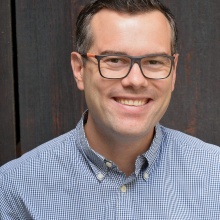As announced on April 8th, the Heidelberg Academy of Sciences and Humanities chose the work of junior research group leader Alexander Schlaich on "Electronic screening using a virtual Thomas-Fermi fluid for predicting wetting and phase transitions of ionic liquids at metal surfaces," which was published in “Nature Materials” and submitted by Christian Holm, Institute of Computational Physics, for the 2024 Academy Prize. This endowed prize aims to encourage early-career researchers and support their scientific endeavors.
The Academy Prize, established by the Association for the Promotion of the Heidelberg Academy of Sciences and Humanities to commemorate the 75th anniversary of the founding of the Heidelberg Academy in 1984, will be bestowed upon Alexander Schlaich in 2024. Schlaich's award-winning work introduced a pioneering computer simulation strategy enabling the modeling of electrostatic interactions with any realistic material. This innovative method facilitated the exploration of wetting transitions at the nanoscale for materials with diverse insulating or metallic properties for the first time. This framework offers a new avenue for predicting the unique behaviors of charged liquids, particularly in conjunction with nanoporous metallic structures, with direct applications in the energy and environmental domains.
Alexander Schlaich pursued his physics studies at the University of Stuttgart and obtained his doctorate from Freie Universität Berlin in 2017, focusing on the interaction and friction of polar surfaces, including water at the nanoscale. Following his doctoral studies, Schlaich served as a postdoctoral researcher at the Laboratoire Interdisciplinaire de Physique in France from 2017 to 2020. Since 2021, he has led the Multiscale Materials Modeling research group at the Stuttgart Center for Simulation Science as a junior research group leader within the Cluster of Excellence EXC 2075 for "Data-integrated Simulation Science," in association with the Institute of Computational Physics at the University of Stuttgart.
The award ceremony is scheduled to take place on June 8, 2024, as part of the annual celebration of the Heidelberg Academy of Sciences and Humanities at Heidelberg University.
Founded in 1909, the Heidelberg Academy of Sciences and Humanities has evolved into the State Academy of Sciences and Humanities of Baden-Württemberg, fostering interdisciplinary exchange through lectures, events, and collaborative research projects involving both established and emerging scholars.
Abstract: Of relevance to energy storage, electrochemistry and catalysis, ionic and dipolar liquids display unexpected behaviours—especially in confinement. Beyond adsorption, over-screening and crowding effects, experiments have highlighted novel phenomena, such as unconventional screening and the impact of the electronic nature—metallic versus insulating—of the confining surface. Such behaviours, which challenge existing frameworks, highlight the need for tools to fully embrace the properties of confined liquids. Here we introduce a novel approach that involves electronic screening while capturing molecular aspects of interfacial fluids. Although available strategies consider perfect metal or insulator surfaces, we build on the Thomas–Fermi formalism to develop an effective approach that deals with any imperfect metal between these asymptotes. Our approach describes electrostatic interactions within the metal through a ‘virtual’ Thomas–Fermi fluid of charged particles, whose Debye length sets the screening length λ. We show that this method captures the electrostatic interaction decay and electrochemical behaviour on varying λ. By applying this strategy to an ionic liquid, we unveil a wetting transition on switching from insulating to metallic conditions.
https://doi.org/10.1038/s41563-021-01121-0


